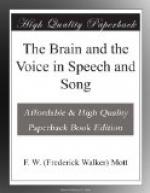THE CEREBRAL MECHANISM OF SPEECH AND SONG
Neither vocalisation nor articulation are essentially human. Many of the lower animals, e.g. parrots, possess the power of articulate speech, and birds can be taught to pipe tunes. The essential difference between the articulate speech of the parrot and the human being is that the parrot merely imitates sounds, it does not employ these articulate sounds to express judgments; likewise there are imbecile human beings who, parrot-like, repeat phrases which are meaningless. Articulate speech, even when employed by a primitive savage, always expresses a judgment. Even in the simple psychic process of recalling the name aroused by the sight of a common object in daily use, and in affixing the verbal sign to that object, a judgment is expressed. But that judgment is based upon innumerable experiences primarily acquired through our special senses, whereby we have obtained a knowledge of the properties and uses of the object. This statement implies that the whole brain is consciously and unconsciously in action. There is, however, a concentration of psychic action in those portions of the brain which are essential for articulate speech; consequently the word, as it is mentally heard, mentally seen, and mentally felt (by the movements of the jaw, tongue, lips, and soft palate), occupies the field of clear consciousness; but the concept is also the nucleus of an immense constellation of subconscious psychic processes with which it has been associated by experiences in the past. In language, articulate sounds are generally employed as objective signs attached to objects with which they have no natural tie.




